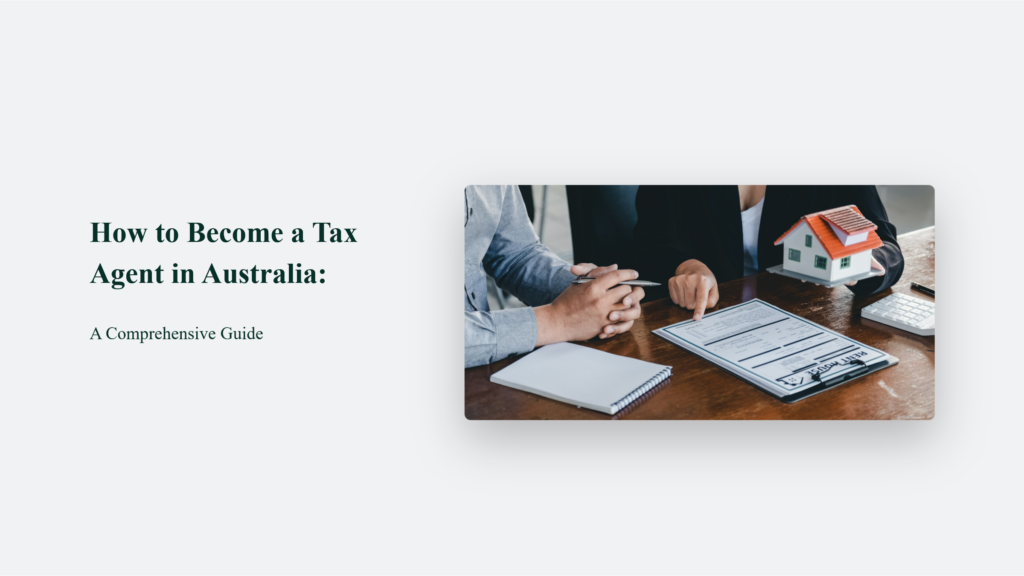

How to Become a Tax Agent in Australia: A Comprehensive Guide

As Seen On
Are you passionate about helping people navigate the complex world of taxes? Do you have a knack for numbers and a keen eye for detail? Becoming a tax agent in Australia might be the perfect career path for you. In this comprehensive guide, we’ll walk you through the steps on how to become a tax agent in Australia.

Understanding the Role of a Tax Agent
Before we dive into the specifics of how to become a tax agent in Australia, let’s take a moment to understand what the role entails.
A tax agent is a professional registered with the Tax Practitioners Board (TPB) and authorised to provide tax advice and services to individuals and businesses. As a tax agent, you’ll be responsible for preparing and lodging tax returns, providing tax advice, and representing your clients in dealings with the Australian Taxation Office (ATO).
It’s a challenging but rewarding career that requires a deep understanding of tax law and a commitment to ongoing learning and professional development.
How to Become a Tax Agent in Australia:
Meet the Educational Requirements
To become a tax agent, you must complete an accountancy qualification from an Australian tertiary institution approved by the Tax Practitioners Board (TPB). It typically involves:
- Completing a Board-approved course in Australian taxation law, which should include a component on the Tax Agent Services Act 2009 (TASA) and the Code of Professional Conduct
- Completing a Board-approved course in commercial law
- Completing relevant subjects as part of a degree or postgraduate program, such as the CPA Program, which includes compulsory and elective subjects in areas like taxation, financial reporting, management accounting, and ethics
Gain Practical Experience
The TPB requires aspiring tax agents to complete the equivalent of 12 months of full-time, relevant experience in the past five years. It can involve:
- Viewing and updating clients’ taxation details
- Preparing, lodging and printing activity statements
- Reviewing client account information
- Communicating with the Australian Tax Office on behalf of clients
- Requesting refunds and credit transfers for clients
- Viewing payment options and making payment plans
Register with the Tax Practitioners Board
Once you have completed the education and experience requirements, you must register with the TPB. It involves:
- Completing an application form
- Providing supporting documentation to prove your qualifications and experience
- Undergoing a “fit and proper person” test to assess your suitability
Nominate as an Authorised Agent
From November 2023, a new “agent nomination” process will require tax agents to be securely nominated by a client in the ATO’s Online services for business before they can access the client’s information and act on their behalf. This extra security step will apply when:
- A client engages a new registered tax or BAS agent
- A client changes the authorisation of an existing agent (e.g. to represent them for a new tax obligation)
Undertake Continuing Professional Education
To maintain registration, tax agents must complete at least 60 hours of continuing professional education (CPE) over a three-year period. It ensures agents stay up-to-date with constantly evolving tax laws and regulations. Becoming a tax agent in Australia requires dedication to gain the necessary qualifications, experience, and registration.
However, it can be a rewarding career path, offering job security, continuous learning, and opportunities for growth and specialisation in the complex and dynamic field of taxation.
Different types of Tax Agents:
Tax Agents
- Prepare and lodge tax returns on behalf of individuals or businesses.
- Must be registered with the Tax Practitioners BoardAre the only people allowed to charge a fee to prepare and lodge tax returns
- Over 80% of tax agents are male.
- More than 55% of tax agents are over 55 years old.
BAS (Business Activity Statement) Agents
- Assist businesses with preparing and lodging their Business Activity Statements.
- Must also be registered with the Tax Practitioners Board
- 78% of BAS agents are sole practitioners
- 80% of BAS agents are female
Tax (Financial) Advisers
- Provide tax advice about financial products and services
- Must be registered with the Tax Practitioners Board if providing tax (financial) advice services for a fee
- Are authorised representatives of an Australian Financial Services (AFS) licensee
While there is some overlap, each type of agent focuses on different areas of tax services. Tax agents primarily prepare individual and business tax returns; BAS agents assist with business activity statements, and tax (financial) advisers advise on the tax implications of financial products and investments. All must be registered with the Tax Practitioners Board to provide their respective tax services for a fee in Australia.
The Bottom Line
Becoming a tax agent in Australia requires a significant investment of time and effort, but it can be a fulfilling and lucrative career choice for those passionate about the field. By understanding the educational and experience requirements, registering with the TPB, and committing to ongoing professional development, you can build a successful practice and positively impact your clients’ lives.
Frequently Asked Questions:
How long does it take to become a tax agent in Australia?
The length of time it takes to become a tax agent depends on your individual circumstances, such as whether you already have a relevant qualification or need to gain practical experience. On average, it can take several years to meet all the requirements and complete the registration process.
How much does a tax agent earn in Australia?
According to data from the Australian Taxation Office, the median annual income for a tax agent in Australia is around $70,000. However, earnings can vary widely depending on factors such as location, experience, and the size of the practice.
Do I need to be a professional association member to become a tax agent?
While membership in a professional association such as the Institute of Public Accountants (IPA) or CPA Australia is not a requirement to become a tax agent, it can be beneficial in terms of networking, professional development, and staying up-to-date with industry trends and best practices.
Konger
Up until working with Casey, we had only had poor to mediocre experiences outsourcing work to agencies. Casey & the team at CJ&CO are the exception to the rule.
Communication was beyond great, his understanding of our vision was phenomenal, and instead of needing babysitting like the other agencies we worked with, he was not only completely dependable but also gave us sound suggestions on how to get better results, at the risk of us not needing him for the initial job we requested (absolute gem).
This has truly been the first time we worked with someone outside of our business that quickly grasped our vision, and that I could completely forget about and would still deliver above expectations.
I honestly can't wait to work in many more projects together!
Disclaimer
*The information this blog provides is for general informational purposes only and is not intended as financial or professional advice. The information may not reflect current developments and may be changed or updated without notice. Any opinions expressed on this blog are the author’s own and do not necessarily reflect the views of the author’s employer or any other organization. You should not act or rely on any information contained in this blog without first seeking the advice of a professional. No representation or warranty, express or implied, is made as to the accuracy or completeness of the information contained in this blog. The author and affiliated parties assume no liability for any errors or omissions.

